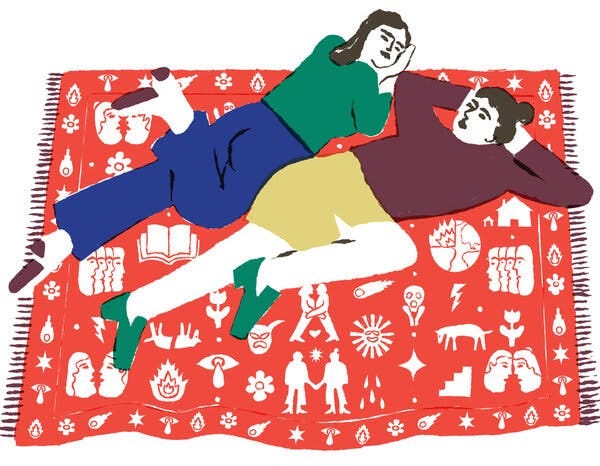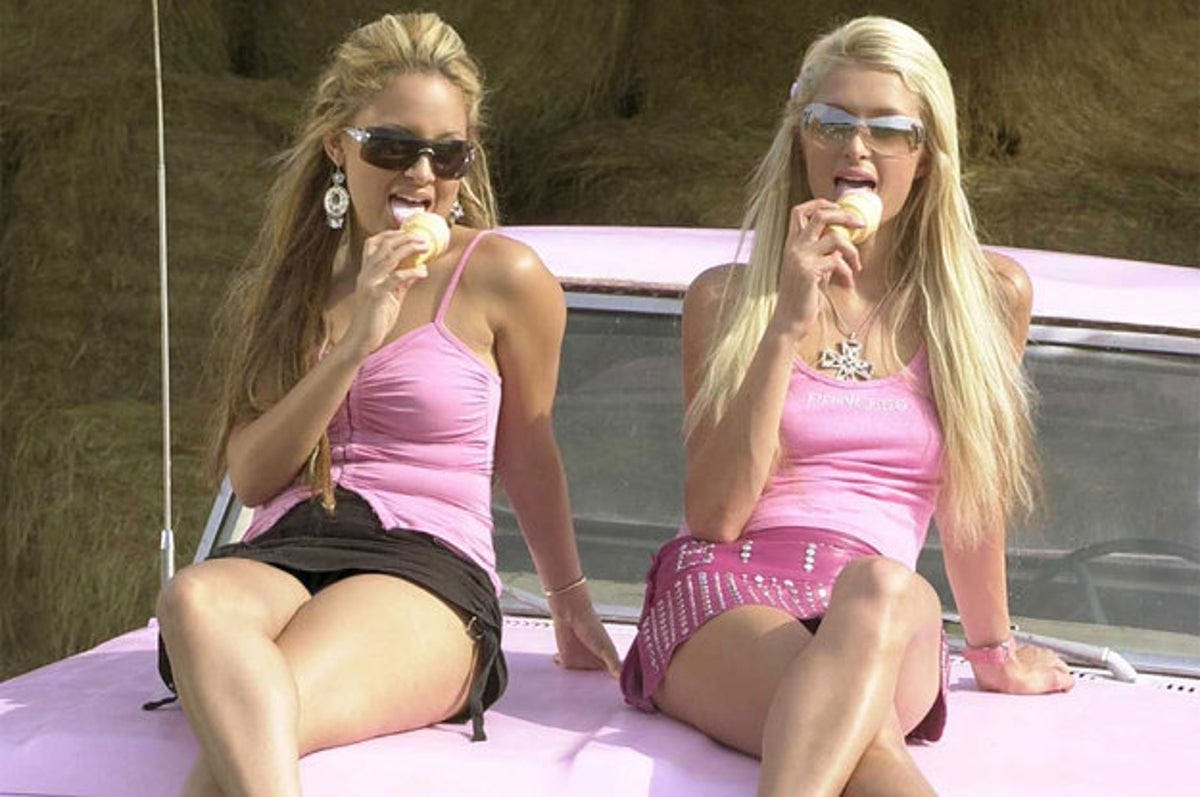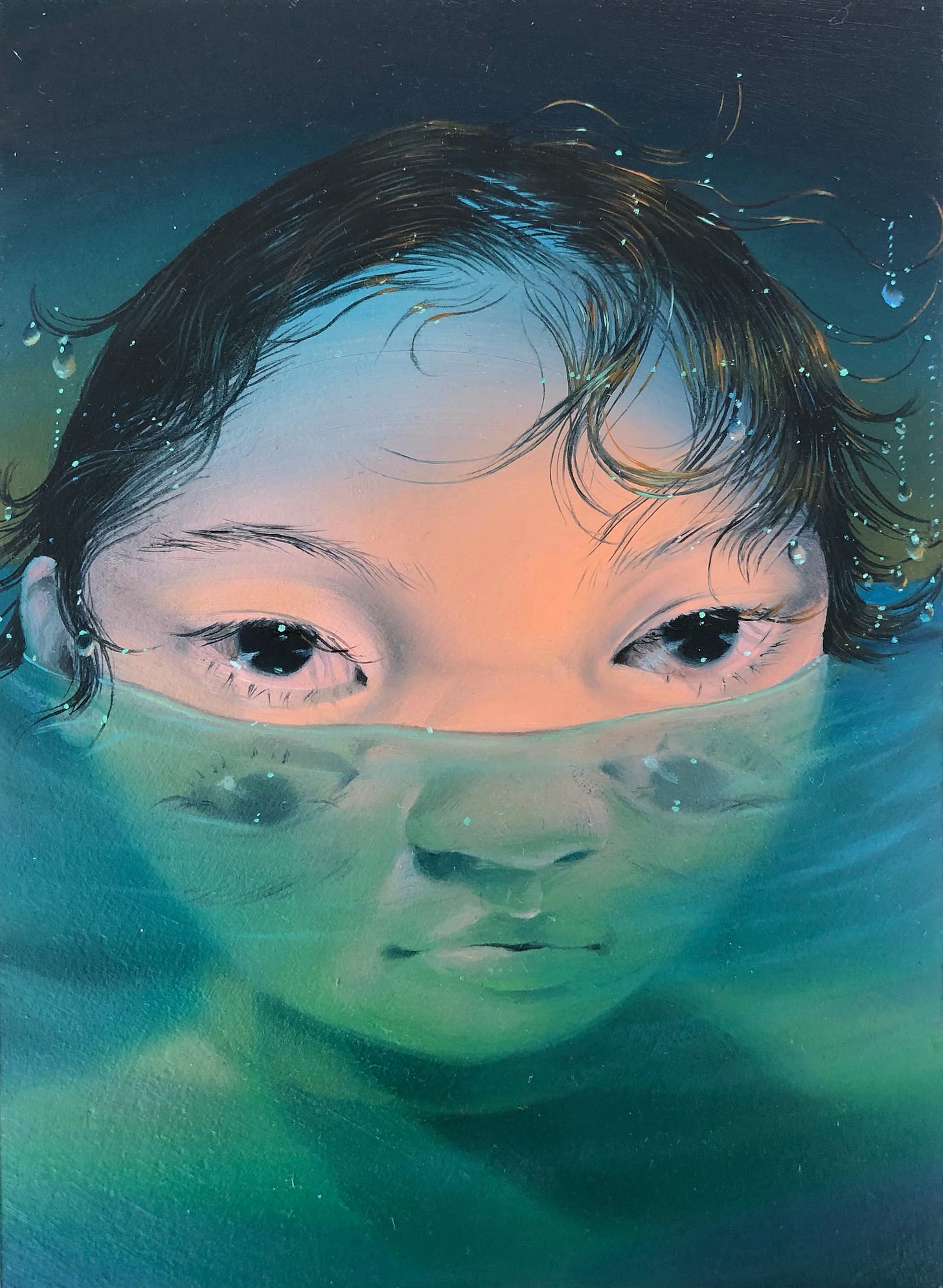Letter #28
Eternal girl under the moon
8:03 p.m. The last night of September. Outside, the cicadas chirp indignantly, as if it wasn’t their idea to keep going. I watch Survivor and imagine competing just long enough to have my cheek bones and hip bones jut out to full effect. I look at the other screen I’ve been staring at all day. The Wikipedia page for “Ego death” has been open in one tab in my browser for 72 hours and counting.
I persuade myself to have the type of depression where I don’t eat, vs. the kind where you eat a lot, by not going grocery shopping. In the morning I should leave my house, but I know I won’t. I’ll sleep too late and stare into the sink when it’s time to brush my teeth.
During today’s day-long scroll I paused on two Instagram graphics (the medium of our time). One was the notion that fretting about the state of your own body post-pandemic is gauche and wrong and should be prosecuted to the fullest extent of the law— i.e., just be glad you didn’t die, you stupid, shallow bitch. The other was that feeling angry or discomfited by someone else’s body is projecting, just freaking stop!! Ugh!! — i.e., stop hating!! You stupid, bitter bitch!! These sentiments were aimed at thin women but spoke directly to me, I who regularly scare off loathsome grandmas at the beach by virtue of my fat ass in a two piece.
Truthfully, against scornful sentient Instagram’s wishes, my relationship to my body has been dictating my actions for a very long time. But sedentary COVID life, as with everything else, has made old habits too obvious to ignore. I’m resigned: I don’t want to go anywhere. I don’t want people to perceive me. I just want to keep doing things that are bad, because it affirms who I am: bad. I know that absolute goodness is contained in the shape of an effortlessly thin woman, which ensures that I will never achieve it.
I know this because I know everything. I know how to be calm and aloof. I know how to walk so I appear more graceful than I am. I know how to not make other people uncomfortable. I know how to angle the camera. I know what people think of me, positively and negatively. I know exactly what I’m supposed to look like, and that it means everything. I know I’ve been failing this whole time.
It’s very late into the night now— the first of October, actually, rabbit rabbit. The cicadas have faded into the sounds of morning cars. Writing this letter I have escaped my body, if not my brain again. I can give you something that resembles love.
: :: :: : :: : : : :::: : :: : :: :: : :::: :: : : : :: :: :: : :: : : : :::: : :: : :: :: : :::: :: : : : :: :: :: : :: : : : :::: : :: : :: :: : :::: :

Beautiful World, Where Are You? by Sally Rooney
Idk people, I loved it. I blushed and I cried. Perhaps it was constructed for me to feel. Is that so wrong?
The plot of Beautiful World, Where Are You? feels familiar if you’ve read Sally Rooney’s other books. There are two friends from college in their early thirties: Alice, who has experienced sudden, massive fame as a young novelist, and Eileen, her equally brilliant best friend who works as an editor at a literary magazine. And their respective significant others: Felix, an uncomfortably honest but kind Amazon warehouse worker, and the exceedingly chivalrous but closed-off Simon, who works at a government-run organization which apparently makes enough money to own a condo in Dublin. Two pairs made up of opposing socioeconomic classes, who subsist on a steady Irish diet of repressed emotions, intellectual exchange, near-willful miscommunication, and sensi, existential sex.
Alice and Eileen grapple with the value of making art in a world that’s falling apart; feeling selfish in caring about love and relationships and beauty while the fate of humanity looms large. Their emails to each other are nuanced, clear-headed ruminations on neoliberalism, the limits of Internet political debate, the Irish housing market, the role of art, fame, and God. Real life interactions with their lovers are awkward, insecure, restrained, filled with longing. Alice and Eileen are far more comfortable intellectualizing their fears and desires than expressing what they want. Intermittently, they’ll look down at their phones, and think about how pointless it all is. In other words, they’re very much like people we know, or are.
Sally Rooney (it just feels like you’re supposed to say her full name) is a scholar. Her course of study as a Trinity College student was rigorous and competitive — almost every early-career article written about her mentions her past as a champion debater, which, to me, explains a lot about the mass appeal of her books, which seems to be a frequent question for old people to posit.
(In addition to the sex scenes. They’re comforting. They all have the vibe of afternoon sex on overcast day, right after a shower, with someone you’re almost in love with. And afterward your hair has never looked better.)
After experiencing massive success and the subsequent discomfort of her particular 21st century celebrity, Sally Rooney’s approach to her third novel was to formally understand the function of the art form itself. The time spent studying the purpose of her own labor has a very clear answer in its result: a study in humanity that serves as an artifact of the time in which it was written. With, more or less, a happy ending for often miserable people. Offering salvation in the form of aesthetic experience: the exact conclusion that she set out to prove.
That her novels appeal to a great deal of people should be no surprise. She’s a Marxist who loves to win. I doubt Sally Rooney set out to design The Millennial Novel — but I would venture to say her approach to work led her to that end. Socialists aim to reach as many people as possible, in a way that the greatest number of people will comprehend, in order to establish solidarity. Debaters prepare by taking in massive amounts of information in order to formulate a strategy to arrive at a point with which it is logically impossible to disagree. And artists reflect the entirety of humanity and the world we inhabit back to us in order to help us understand ourselves. With that kind of scale and discipline at her disposal, Sally Rooney can’t help but embody the contradictions that she continues to interrogate. Which might be maddening to some people (i.e. haters). But I happen to admire a woman who succeeds in bringing her vision to life. And I look forward to the answers she’ll continue to glean.
Alice and Eileen, Lila and Lènu, Paris and Nicole … hehehe. I’ve been indulging in a life-affirming re-watch of the Simple Life, a perfect specimen of the early 00s. An artifact of the times, you could even say. If I were an absolutely insane Extremely Online person I would write an essay about Paris Hilton’s stomach and how it made me hate myself in addition to being bisexual. But I won’t! I will just enjoy this media for what it is: fun trash! Wheeeeee!
Like a Sapphic “Teenage Dream” with a Paula Cole twist and I’m into it.
ESG, “Keep It” (and every other song)
If you don’t know about Emerald, Sapphire, and Gold, find out. Sisters who were given instruments as a way to escape the drugs plaguing their South Bronx neighborhood in the early 1980s, they came up with a wholly original sound that had no genre but inspired (and was extracted by) all of them. Inimitable, subject to plundering, they are true treasure, never to be repeated.
This artist appears to have been born in 1998, which seems illegal, but I’ll go on because she’s so talented. I love this contemplative, half-underwater gaze of an eternal girl under the moon, and the particular glee of not giving a fuck in the great outdoors that she captures with such skill and attention to light. The girls of her paintings are unencumbered by the male gaze, and seem to have magically stayed that way rather than consciously unlearned it. They have nothing separating them between their bodies and the world; they take up space, indiscriminately, grinning and glaring, without a second thought.
For my last trick, I made you a playlist, please go fall in love and let it die then do it all over again. It’s that time of year, you know.
Life’s so fun,
Life’s so fun,
Delighter



